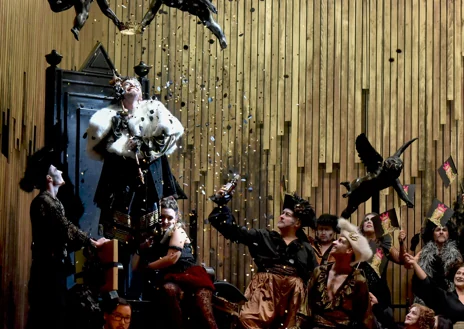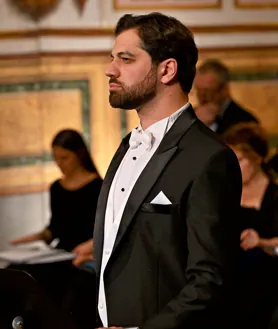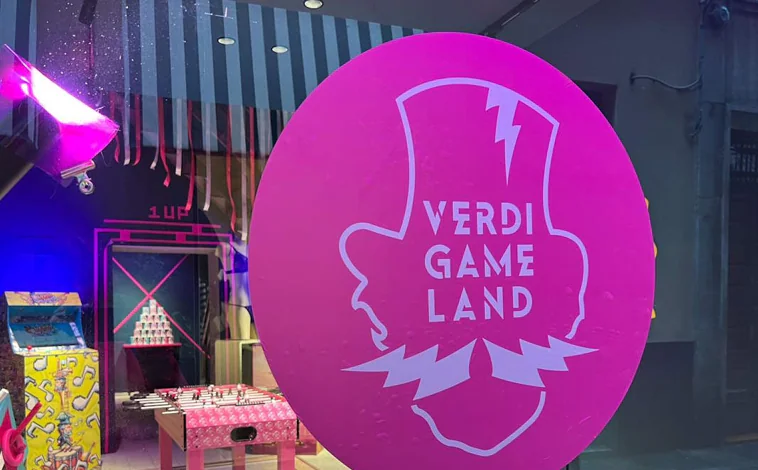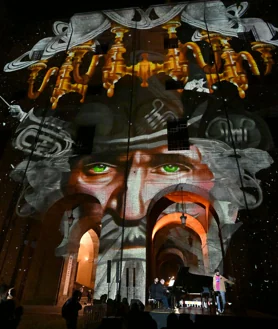In his autobiography, the tenor Giuseppe di Stefano stated that «Parma is to the lyric what Seville is to bullfights; “The audience feels like they are the protagonist, an integral part of the show that they are passionate about.” These are no longer the distant times of the mythical partner of Maria Callas, where the fans of the upper galleries (‘loggione’, in Italian) of the Teatro Regio imposed their particular law of tradition, acclaiming or sinking singers. This substratum explains the lyrical passion of the Parmesan capital, which with the arrival of autumn celebrates each year the festival dedicated to its most notable neighbor: Giuseppe Verdi.
Under the heading of ‘Power and politics’the cycle represented four Verdi operas between September and October and a large program of recitals, lyrical galas and symphonic concerts, which filled not only the city of Parma, but also the neighboring Fidenza and Busseto, the composer’s hometown, with music. «We are above all a monographic festival», details artistic director Alessio Vlad, «and When that author is Verdi, the responsibility is enormous, it is a challenge. We must represent a place where what is offered sets a standard.
The Festival collaborates closely with the Institute of Verdian Studies, «and when we have a question during rehearsals, I write to its director, who by pressing a button on his iPad accesses the Verdian manuscripts; “That is a unique experience.” Parma knows it’s not Salzburgnor does it have the budgetary slack of Vienna, London or Milan, and yet it has become a reference on the calendar European lyric.
«Verdi is the musician of life; “He is the author of the future.”wrote Riccardo Muti in his essay about the composer. But what is so special about it? “The pathos, so much pathos,” insists Marina Rebeka, who has had great success this edition with ‘La battaglia di Legnano’, “and the freedom it gives the singer.” The Latvian soprano is very loved in the city, where she studied for three years, in addition to participating in the Verdian voice competition and having made the composer’s work one of her workhorses.
Verdi and Italy
For Luciano Ganci, tenor present in the festival’s ‘Attila’ and ‘Macbeth’, «singing Verdi means giving life to the history of Italy; We have the responsibility to keep alive a musical and political tradition, at a time when the need is felt to unite not Italy, but its citizens; “There is too much division.” Between soprano and tenor they accumulate almost forty Verdian roles. Rebeka dreams “of singing Abigaille”, the villain of ‘Nabucco’, and restoring her “her original lyrical vocality, but without tiring my voice”; Ganci is committed to continuing to be “one of Verdi’s greatest servants”, with new roles on the agenda in the coming years.
“His music tells us so many things… It presents us with all the moods of the human being.” Enzo Petrolini, the president of the ‘Club dei 27’an association of passionate Verdians, an institution in the city. Its members are as many as Verdi composed operas (with the addition of his Requiem), and each of them gives its name to its members. Founded in 1958, its founding work is the dissemination of Verdi’s work, which they have been doing for forty years in Parmesan schools, with competitions and workshops. Within the festival they organize ‘Fuoco di Goia’, a charity gala whose proceeds go to small welfare associations. “We have earned more than 120,000 euros in the ten years of galas,” says Petrolini.



Marina Rebeka in ‘La battaglia di Legnano’ / Scene from ‘Un ballo in maschera’ / Giorgi Manoshvili in ‘Attila’
Parma’s feared ‘loggione’ is legendary, although for the president of the 27 it is no longer what it was. “Some of the veterans remain, but they have changed, because so has how we listen to music.” To Regio, he states categorically, “you come to hear voices”. “It is a wise public,” intercedes Alessio Vlad, “that knows Verdi’s work and demands that, when presenting them, we do so with due respect: with humility and without superficiality.”
Petrolini still remembers the last time protests by the loggionisti forced the early conclusion of an opera. «It was in the third act of ‘La Traviata’, in December 1979, with Bruson and the Mauti Nunziata. There was such a fight that the curtain was lowered without the performance ending. Those times are not the ones we live in, although Marina Rebeka doesn’t frown. «I know what is demanded here, but I am not afraid; If whistles come to me, then let them come. “It will be something to remember.” Ganci accepts the challenge, because “no one demands more from me than myself.”
There is a project
The Festival goes beyond the walls of the theaters and goes out to meet the citizens with the ‘Verdi Off’, a parallel program with almost a hundred activities, shows, meetings and exhibitions that has completed its ninth edition. “They are two sides of the same coin,” explains Luciano Messi, sovrintendente of the Teatro Regio. Their vision seeks to expand the concept of ‘community’, and not be limited to fans who purchase a ticket. “It must be understood in a broad way, and it is a journey that begins from below,” through “a strong daily dialogue with contemporary society.” «A theater is an expression of a society; the Regio is an identity symbol of Parmawhich projects itself and dialogues with the world without forgetting its roots,” he summarizes.
Messi’s project – arrived at the Regio in 2022 after a long career in other theaters and recently renewed for three more years – aims to undock the opera from the stereotype of a “distant and closed” cultural manifestation, only within the reach of wealthy pockets. Also banish the image of a theater that only opens to host shows. “Too often they are closed, and must once again be places of social aggregation”, meeting points. Rehearsals, workshops and visits keep the Regio alive, which also houses the only classical music record store in the city, managed by Armando and Daniela Azzali.
Both the Verdi Festival and the Teatro Regio are solvent. More than half of its budget comes from private sponsorships
Transversality characterizes the ‘Verdi Off’: urban parades, contemporary art exhibitions based on the master, performative installations that interact with the visitor, events for children, video exhibitions and even a ‘Verdi cuckoo’ in which every day at 1 p.m. An aria was performed on piano in the arcades of the Regio.
Of the Verdi Festival accounts, which amount to 5.5 million euros, the 3 that come from private sponsorships stand out. «The festival generates a transfer of 62% on the territory of Parma; For every 10 euros invested, 31 are returned, an important multiplier effect” that is measured annually through a study prepared by the local university. Only 1.5 million of the budget comes from public coffers. In all of the Regio’s activity, throughout the year, public/private participation is distributed 50%. Parma destroys the image of bankruptcy that is attributed to many Italian theaters.
The operas
The star opera of the festival has been ‘Macbeth’, in the French version premiered in Paris in 1865, which had not been performed on stage since then. A historical recovery signed by Pierre Audi, with a minimalist proposal, which delves into the theatrical nature of the opera. Two little-known singers, like the baritone Ernesto Petti and the soprano Lidia Fridman, embody the dysfunctional marriage of the Macbeths: he, solid and sonorous; her, with the personality and voice to outline the evil of her character. Luciano Ganci convinced with a brave and brilliantly sharp Macduff; Michele Pertusi was a flawless Banquo. Although the great winner was Roberto Abbadowith an outstanding orchestral reading, full of nuances and details, recognized by the Regio audience.


Different activities of the parallel cycle: the Verdi ‘Gameland’, the street parade and the concerts with projections
‘La battaglia di Legnano’ (1849) is an early Verdi, which places a love triangle in the context of the wars between Italians and Germans at the end of the 19th century. XII. The regista Valentina Carrasco directs the action towards an indeterminate time, any war scenario, with many papier-mâché horses, symbols of barbarism. A stage horror. Soprano Marina Rebeka shines with her own light, a passionate Lida sung exquisitely; and the brio of Antonio Poli as Arrigofull of courage although not always brilliant in the high register. The class of Vladimir Stoyanov’s Roderigo is more in his phrasing and his understanding of the Verdian word than in vocal material limited in projection and extension. The baton of the very young Diego Ceretta (1996) is correct, leading the Orquesta del Comunale of Bologna through a classic reading (sometimes too much) of the Verdian score.
The charming Magnani Theater in Fidenza exudes that aroma of provincial Verdi: Its inauguration, in 1861, was with ‘Il Trovatore’, and a good part of the composer’s production has passed there, regardless of the smallness of its stage or its pit. It is the dream of any fan, because the voices sound as if they were in their living room. The Festival brought to its stages a ‘Attila’ (1846) in concert version, very well served in the role of the eponymous protagonist, bythe Georgian bass-baritone Giorgi Manoshvili, with a firm and ringing center and treble, and a perhaps somewhat less sonorous bass: an upward value. She was pleasantly surprised by Marta Torbidoni’s Odabella, who is not the lyrical-spinto soprano that the role demands, but who sang with character and good taste, which is no small thing. Due to a last minute cancellation, the Foresto fell to Antonio Corianò, a tenor without the color or accents that Verdian singing demands. Claudio Sgura was an Ezio as monolithic as he was resounding. In the pit, Ricardo Frizza conducting the Arturo Toscanini Philharmonic successfully combined the most melodic passages of the score, in arias and choral scenes, with the fire and ardor that the cabalettas and the concertantes appreciate.
Also in Fidenza it could be heard an unforgettable recital by Mongolian baritone Amartuvshin Enkhbatprobably the most beautiful timbre of the string in the last thirty years, accompanied by an increasingly flexible and modulated song. Accompanied by piano, the performer made the audience go crazy with his approaches to the arias of Germont, Carlo di Vargas and Nabucco. Because it’s not just the color, it’s the middle voices, the ease in the high notes, the long phrases… A singer called to mark an era in the grateful Verdian baritone roles.
And if the Magnani is charming, the Verdi in Busseto is even more secluded. Barely 300 seats in an almost pocket-sized and charming theater. The festival served here ‘Un Ballo in Maschera’ with young voices of an acceptable levelamong which Ludovico Filippo Ravizza’s Renato stood out, the most sonorous presence of the cast. Davide Tuscano (Riccardo) liked his timbral color, although his singing was overly affected; Caterina Marchesini’s Amelia showed solvency but, at the same time, lack of vocal adaptation to such a demanding role. Conducting a reduced version of the Giovanile Italiana orchestra was Fabio Biondi, a regular in the baroque repertoire. He directed the performers in detail, but with some passages that were too slow and asked for more verve. The production, functional and attractive for a very limited space, immersed the action in a Halloween-esque setting, with some striking moments.
Report a bug
#Parma #global #idea #Verdi #city


